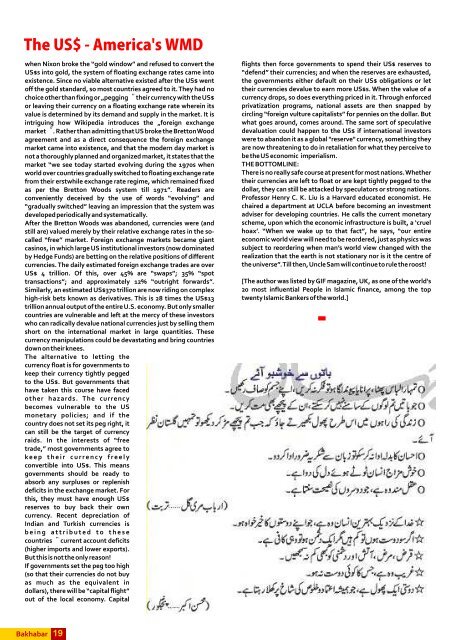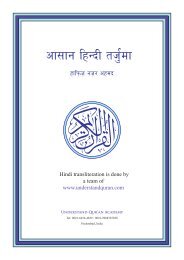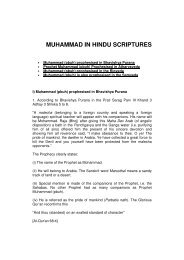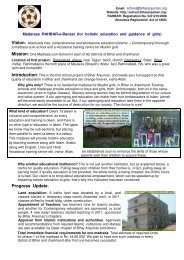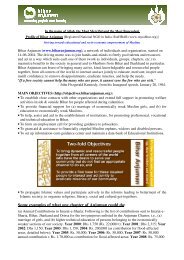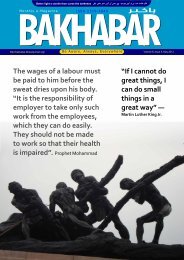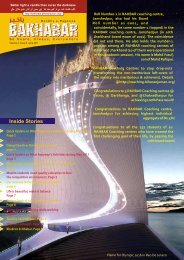The US$ - America's WMD… By Dr. Mansoor Durrani, CEO, Senior Vice-President, NCB, JeddahUS domination of the world affairs is often attributed, among others, worth of goods for that US$. The difference between these twoto its technological prowess; nuclear arsenal; fleet of aircraft carriers; values is called “seigniorage” and its benefits go directly to the USsatellite networks gathering intelligence round-the-clock. But its government. Further, the US$'s position in the world allows themost potent weapon that has wrecked foreign economies;destroyed nations; and has been used to buy Prime Ministers,Presidents, Army Generals, Judges and Ministers is often ignored.That is the power of its currency. United States dollar (US$) was bornwhen Continental Congress of the United States authorized theissuance of the US$ on 8 August 1785. Post World War II (WWII) thecreation of The International Monetary Fund (IMF) & The World Bankwas the first step towards establishing a global US$ hegemony. TheUS sat back and watched the WWII unfolding, saying that this wasnot its war, until the attacks on Pearl Harbor.In response, after nuking Japan, the US-led allied forces claimedvictory in this global mayhem. Nearly all the European and Asiancountries were war-wrecked and started borrowing from the US torebuild their infrastructure and economies. This gave the US anopportunity to develop institutions and make fiscal policies toenslave the world in the coming decades.The centerpiece of this neo-imperialism was to turn a green piece ofpaper into the most lethal weapon the world has ever witnessed. US government to borrow money at exceptionally low interestsStarting from Bretton Woods to the US$ hegemony and then to the rates due to high demand for the US$. This phenomena ismodern day foreign exchange (currency) markets, understanding generally called "exorbitant privilege" and allows the US to run athese three phases are essential to grasp the intricacies of the balance of payments deficit "without tears," as French economistsubject.Jacque Rueff said.BRETTON WOODS:DOLLAR HEGEMONY:The Bretton Woods Accords were entered into at the end of World The above was an initial phase of the dollar hegemony. AnotherWar II, on 22 <strong>July</strong> 1944, “to regulate the international monetary important development followed that allowed the dollarsystem”. The chief features of the Bretton Woods system were an hegemony to grow further. Till 1970s, the world oil resources wereobligation for each country to adopt a monetary policy that owned by 7 private American and European oil companiesmaintained the exchange rate by tying its currency to the U.S. dollar popularly called “Seven Sisters”. Due to domestic pressure, oiland the ability of the IMF to bridge temporary imbalances of producing nations began “nationalizing” their oil fields. This waspayments. Currencies were allowed to fluctuate from this “peg” only achieved by buying the equity stakes of foreign oil companies.within a very narrow band of plus or minus one percent. The principal This “transfer of ownership” was allowed by the US on onearchitects of the Bretton Woods Accords were British economist John condition: the oil will be priced (bought and sold) in US$ only! AsMaynard Keynes and Assistant U.S. Treasury Secretary Harry Dexter long as oil transactions were denominated in US$, the USWhite. Keynes envisioned an international central bank but the essentially controlled all the oil in the world financially regardlessUnited States had just become the world’s only financial superpower of who owned the oil fields. This reduced all oil producing nationsand was not ready for that step in 1944. The IMF system was into mere The U.S. dollar, which was originally backed by gold,formulated by Dexter White, and it reflected the power of the was now “backed” by oil. Every country had to acquire US$ toAmerican dollar. Under the White Plan, the US$ would be backed by purchase this essential commodity. Oil-importing countriesgold, which were considered “as good as gold” because the United around the world were left with two options: (a) borrow US$ fromStates had agreed to maintain their convertibility into gold at US$35 the IMF/World Bank by signing up to atrocious conditions or (b)per ounce. As long as people had faith in the US$, there was little fear earn US$ by producing exportable goods for paying expensive oilof running out of gold, because gold would not actually be used. The import bills. Even if it meant diverting productive capacity awayBretton Woods worked for a while, but it was mainly because fewer from feeding and clothing their own people. After falling off withcountries actually converted their dollars into gold. Trade balances his US masters, Saddam tried to sell Iraqi oil in non-US$were usually cleared in US$, due to their convertibility into gold. US currencies. Thus the wars in Iraq were less about physicallysuffered a great blow in the Vietnam War. International confidence in controlling oil and more about keeping oil denominated in thethe US economy declined. The French started converting their US$ US$ and protecting US$ hegemony. The difference is subtle butreserves into gold. Other countries followed. The US had lent more important. This is why central banks around the world have beendollars than the gold it had in its vaults. A massive conversion would forced to hold more US$ reserves than they need. While the tradedrivethe US into bankruptcy. President Nixon issued Executive Order surplus nations are forced to lend their export earnings back to the11615 in August 1971 closing the “gold window” permanently. This US, these same nations are starved for capital as export earningsmeant the dollar would not be converted (a promise on which it was in US$ are only invested in their export sectors to earn more US$.originally issued) into gold anymore. Since the US was a superpower The domestic sector with local currency earnings remain of littleno country would dare retaliate let alone go to war. This act was interest to global corporations. As a result, domesticknown as the Nixon Shock. The result of taking the dollar off the gold development stagnates for lack of capital.standard was to finally take the brakes off the printing press. Now FOREIGN EXCHANGE:Fiat dollars (or dollars backed by nothing) became the new global The foreign exchange currency transactions mean that one partycurrency!purchases a quantity of one currency in exchange for paying aThe cost of producing a US$ to the US is simply the cost of printing quantity of another. As per the Bretton Woods system thethe note, whereas a foreign government must provide a US$‟s exchange rate of nearly all countries (currencies) were fixed. But<strong>Bakhabar</strong>18
The US$ - America's WMDwhen Nixon broke the “gold window” and refused to convert theUS$s into gold, the system of floating exchange rates came intoexistence. Since no viable alternative existed after the US$ wentoff the gold standard, so most countries agreed to it. They had nochoice other than fixing or „pegging‟ their currency with the US$or leaving their currency on a floating exchange rate wherein itsvalue is determined by its demand and supply in the market. It isintriguing how Wikipedia introduces the „foreign exchangemarket‟. Rather than admitting that US broke the Bretton Woodagreement and as a direct consequence the foreign exchangemarket came into existence, and that the modern day market isnot a thoroughly planned and organized market, it states that themarket “we see today started evolving during the 1970s whenworld over countries gradually switched to floating exchange ratefrom their erstwhile exchange rate regime, which remained fixedas per the Bretton Woods system till 1971”. Readers areconveniently deceived by the use of words “evolving” and“gradually switched” leaving an impression that the system wasdeveloped periodically and systematically.After the Bretton Woods was abandoned, currencies were (andstill are) valued merely by their relative exchange rates in the so-called “free” market. Foreign exchange markets became giantcasinos, in which large US institutional investors (now dominatedby Hedge Funds) are betting on the relative positions of differentcurrencies. The daily estimated foreign exchange trades are overUS$ 4 trillion. Of this, over 45% are “swaps”; 35% “spottransactions”; and approximately 12% “outright forwards”.Similarly, an estimated US$370 trillion are now riding on complexhigh-risk bets known as derivatives. This is 28 times the US$13trillion annual output of the entire U.S. economy. But only smallercountries are vulnerable and left at the mercy of these investorswho can radically devalue national currencies just by selling themshort on the international market in large quantities. Thesecurrency manipulations could be devastating and bring countriesdown on their knees.The alternative to letting thecurrency float is for governments tokeep their currency tightly peggedto the US$. But governments thathave taken this course have facedother hazards. The currencybecomes vulnerable to the USmonetary policies; and if thecountry does not set its peg right, itcan still be the target of currencyraids. In the interests of “freetrade,” most governments agree tok e e p t h e i r c u r r e n c y f r e e l yconvertible into US$. This meansgovernments should be ready toabsorb any surpluses or replenishdeficits in the exchange market. Forthis, they must have enough US$reserves to buy back their owncurrency. Recent depreciation ofIndian and Turkish currencies isb e i n g a t t r i b u t e d t o t h e s ecountries‟ current account deficits(higher imports and lower exports).But this is not the only reason!If governments set the peg too high(so that their currencies do not buyas much as the equivalent indollars), there will be “capital flight”out of the local economy. Capitalflights then force governments to spend their US$ reserves to“defend” their currencies; and when the reserves are exhausted,the governments either default on their US$ obligations or lettheir currencies devalue to earn more US$s. When the value of acurrency drops, so does everything priced in it. Through enforcedprivatization programs, national assets are then snapped bycircling “foreign vulture capitalists” for pennies on the dollar. Butwhat goes around, comes around. The same sort of speculativedevaluation could happen to the US$ if international investorswere to abandon it as a global "reserve" currency, something theyare now threatening to do in retaliation for what they perceive tobe the US economic imperialism.THE BOTTOMLINE:There is no really safe course at present for most nations. Whethertheir currencies are left to float or are kept tightly pegged to thedollar, they can still be attacked by speculators or strong nations.Professor Henry C. K. Liu is a Harvard educated economist. Hechaired a department at UCLA before becoming an investmentadviser for developing countries. He calls the current monetaryscheme, upon which the economic infrastructure is built, a ‘cruelhoax’. “When we wake up to that fact”, he says, “our entireeconomic world view will need to be reordered, just as physics wassubject to reordering when man’s world view changed with therealization that the earth is not stationary nor is it the centre ofthe universe”. Till then, Uncle Sam will continue to rule the roost![The author was listed by GIF magazine, UK, as one of the world's20 most influential People in Islamic finance, among the toptwenty Islamic Bankers of the world.]<strong>Bakhabar</strong>19


